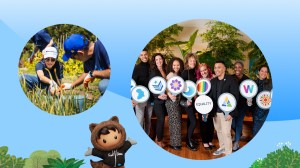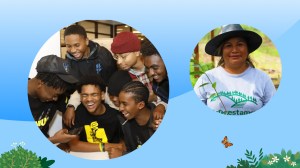Data can have a tremendous impact in communities — from stopping the spread of infectious diseases to addressing homelessness and hunger, to ensuring that every child has the chance to succeed in school.
Neal Myrick, who led the Tableau Foundation for almost 10 years, has recently taken on a new role as VP of Transformative Philanthropy at Salesforce. We sat down to discuss how, since joining forces in 2021, Tableau and Salesforce philanthropy teams are using their combined superpowers to accelerate impact in communities around the world.
Q: What led you to a career in philanthropy?
Giving back has always been a core part of who I am, so I went in pursuit of what that could look like for me as a career.
I landed my first role in the nonprofit sector leading IT for the Casey Family Programs and then ran a small nonprofit for a couple of years. I quickly found that the way the philanthropy sector supports nonprofits was ineffective and broken – a revelation that would shape the rest of my career.
When I helped start the Tableau Foundation in 2014, we designed a unique approach to address these issues and improve how funders and nonprofits work together.
Q: How do the Tableau Foundation and Salesforce Philanthropy work together?
The Tableau Foundation started working with the Salesforce philanthropy team after the acquisition in 2019. Since then, we’ve found that our two teams really align on values and purpose – and we’ve realized that we are stronger and more effective together.
Now, we’re able to leverage the unique strengths that we each bring to the table. Salesforce’s success comes in large part because of how it listens to customers. We extend that listening superpower to our philanthropy — listening to grantees and communities the same way we listen to customers in the business world.
Tableau, like Salesforce, is also really good at building deep, long-term partnerships with nonprofits. We’re excited to deepen that superpower as part of Salesforce Philanthropy and continue building partnerships that deliver for our communities.
Q: What does “Transformative Philanthropy” mean to you?
In his book, Marc Benioff says: “The future isn’t about learning to be better at doing what we already do. It’s about how far we can stretch the boundaries of our imagination.”
In my new role, I’ll be working across the organization and with our partners to explore new and exciting avenues for impact. My job is to find and leverage innovative ideas – sometimes from unlikely sources – to apply in our communities.
Philanthropy needs to be at its best right now, and that means finding new ways to support those doing the (really hard) work in our communities every day.
Q: What are your priorities headed into this new role?
A big one is co-creation. Too often, solutions are created in a conference room and then imposed upon a community. We want to flip the script and co-create solutions with our partners and the communities they’re serving. We don’t want to innovate for the sake of innovating. We want to innovate to improve people’s lives in a meaningful way.
A second priority is partnerships. I want to continue to prioritize partnerships that are rooted in our core competencies. Tableau’s core competency is data analytics, so we worked with our nonprofit partners to figure out how to use data analytics to advance their goals. I’d like to extend that approach to Salesforce partnerships, too. We must continue to focus on our core competencies and where we can make the most impact.
Finally, we will continue to be very focused on equality. Equality is a core value here at Salesforce and a guiding principle of our philanthropic work. I want to continue paying close attention to the funder-grantee power hierarchy, and actively work to broker true and trusted partnerships with community organizations.
Q: What’s your vision for the future of Salesforce Philanthropy, and the future of the philanthropy industry as a whole?
Given all of the changes society has faced over the last several years, I think philanthropy is at a critical inflection point. The problems we face seem to be getting bigger, faster, and more complex – and they demand more from us as a sector.
We know that philanthropy alone can’t solve these problems. That’s why we’re increasingly working across the business – with colleagues in sustainability, purchasing, equality and others – to bring the full power of Salesforce to these pressing issues.
My hope is that together, we can push the boundaries and help unlock new solutions. And as we push those boundaries, we’ll develop frameworks and models that can help other organizations deepen their impact. If we want to be a leader, we must continue to bring others along with us.
More information:
- Learn more about Salesforce Philanthropy.
- Reach about our most recent giving efforts in this article.
- Explore Salesforce’s giving history in the article Salesforce Hits Half a Billion Dollars in All-Time Giving.














